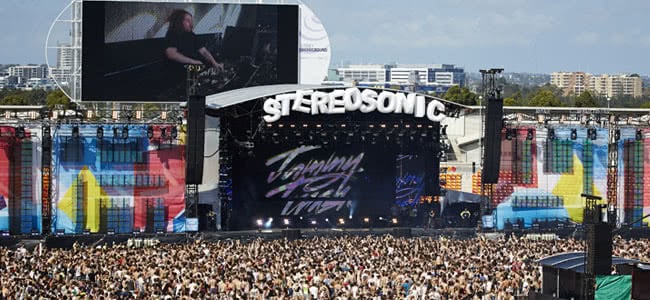The American investment company looking to buy up Australia’s Totem Onelove Group, the company behind the hugely successful electronic music festival Stereosonic, looks to have raised enough money to buy up the Australian promoters in its bid to establish itself as the world’s largest promoter of electronic music.
SFX Entertainment made a move to buy up the parent company of Stereosonic for $75 million in July ahead of the festival’s 2013 edition and expansion into a two-day festival around Australia this December (which has the feathers of Perth’s conservative Claremont Council particularly ruffled).
The bid from SFX Entertainment to buy up Totem Onelove and Stereosonic was part of SFX Entertainment’s proposed $1 billion expenditure to expand their acquisitions this year, which has seen SFX snapping up a huge repertoire of electronic music companies, as Bloomberg reports.
Along with making a pass at buying up Totem Onelove, SFX Entertainment purchased primary shares in Made Event LLC – responsible for Electric Zoo in New York (which was marred by multiple drug overdose deaths this year), massive EDM company ID&T, Denver-based Beatport, Germany’s I-Motion GmbH Events, and TomorrowWorld (home of the world’s worst drug report), all in a move for SFX to compete as the EDM equivalent of the world’s largest concert promoters, Live Nation.
But in order to complete its purchase on its monopoly of dance music events, SFX Entertainment had to raise the necessary funds for the many purchases by floating on the stock exchange in a public sale that hasn’t quite sparked the interest of investors as much as the company initially hoped, wanting to raise $200 million by offering 16.7 million shares at a price of $11 to $13, as Billboard reports.
In September, SFX Entertainment’s market value was pegged at $1.1 billion – compared to Live Nation’s $3.5 billion – and though the investment company raised $260 million on Wall Street (trading on the NASDAQ Global Select Market under the ticket “SFXE) last week in its US initial public offering (IPO), that initial 16.7 million shares of $11 to $13 fell to $11.1 to $11.89 by this week, a decline of almost 9% on its first day of trading.
Although its shares drastically fell, SFX Entertainment still raised around $260 million from the IPO, which it now needs to finish its transactions or risk losing millions. As a NASDAQ reports shows, if SFX Entertainment doesn’t complete its purchase of Totem OneLove by the end of the month, the Stereosonic company will “be entitled to retain our deposit of AUD$5.0 million,” in SFX Entertainment’s words.
Love Music?
Get your daily dose of metal, rock, indie, pop, and everything else in between.
Despite seemingly raising the necessary millions to buy up its EDM pool – including Stereosonic – the shaky Wall Street debut is a troubling sign for SFX Entertainment in its plans to compete with Live Nation.
However, Wall Street traders have good reason to see investment into the music industry as a risky ‘high revenue, low margin’ business. One need only look at the recent shake-up of Australia’s music festival market to appreciate the skepticism, while the drug culture that surrounds electronic music festivals is an ongoing stigma for the business-minded.
Many companies don’t want their money-making ventures associated with bad press and perception, the kinds that the attitudes of a damning mainstream media generated over the drug-related deaths of a punter at Australia’s Defqon.1 festival and the recent cancellation of New York’s Electric Zoo demonstrate. The latter event was scooped up by SFX Entertainment in their purchase spree, and acknowledged the risks in a Securities Exchange Commission document (which can be viewed here).
The drug-related fatalities at the Electric Zoo festival are referenced in the filing under a segment titled ‘Risk Factors’; “These consequences may also make it more difficult for us to obtain or retain sponsorships, lower consumer demand for our events, subject us to liability claims, divert management’s attention from our business and make an investment in our securities unattractive to current and potential investors,” reads the SFX document. “These outcomes could have the effect of lowering our revenue profitability and/or our stock price.”
So it goes, with Billboard reporting that NASDAQ investors – who’ve had a working history with publicly traded music companies like Napster, Pandora, Warner Music Group, and Live Nation – showing wary signs of investing into the EDM conglomerate as its share prices fell sharply in the first day of public trading.
Despite the potential blow, SFX Entertainment’s CEO and namesake, Robert Sillerman, is no stranger to dealing with the rise and fall of the concert industry, as Bloomberg points out.
Sillerman believes the EDM boom is far from a fad, but the new face of popular music fandom, understanding its consumerist benefits and money-making potential as well as its cult appeal across a range of genres. “Just as someone was a fan of the Allman Brothers wouldn’t go see U2, neither would a fan of trance go see dubstep exclusively,” Sillerman sagely offers.

































